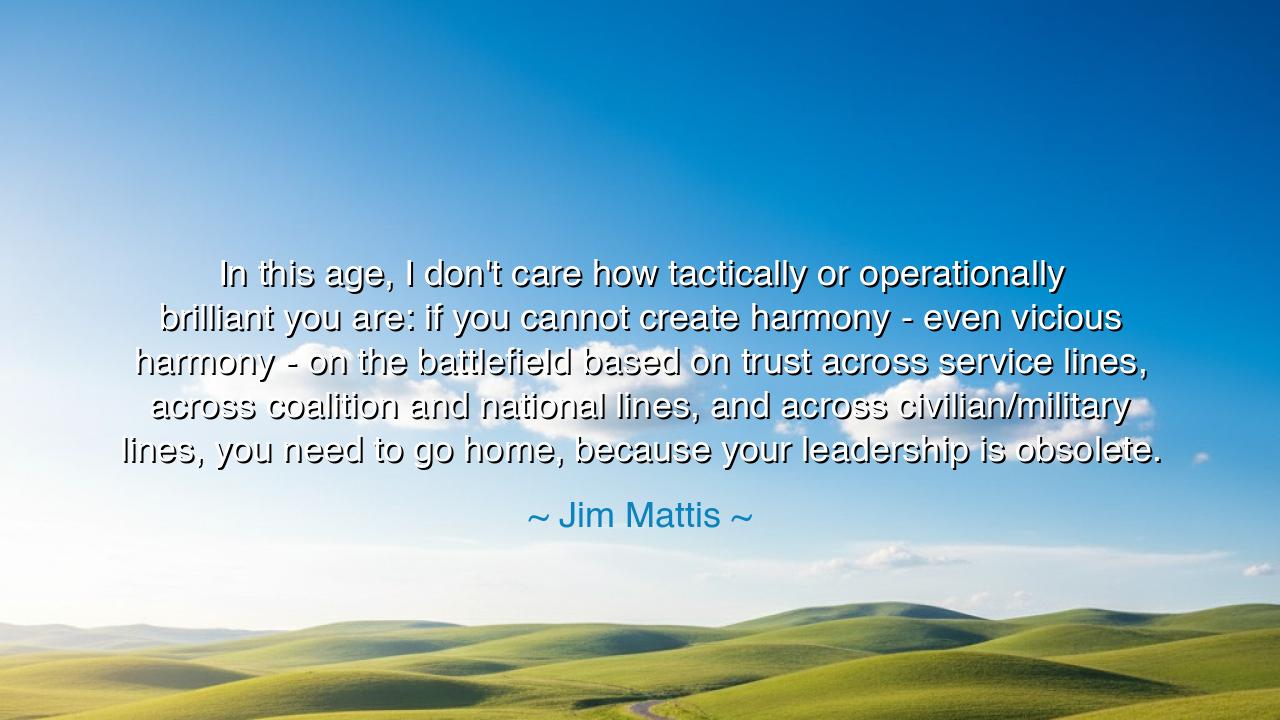
In this age, I don't care how tactically or operationally
In this age, I don't care how tactically or operationally brilliant you are: if you cannot create harmony - even vicious harmony - on the battlefield based on trust across service lines, across coalition and national lines, and across civilian/military lines, you need to go home, because your leadership is obsolete.






"In this age, I don't care how tactically or operationally brilliant you are: if you cannot create harmony - even vicious harmony - on the battlefield based on trust across service lines, across coalition and national lines, and across civilian/military lines, you need to go home, because your leadership is obsolete." These powerful words from Jim Mattis, a revered military leader, capture the essence of modern leadership in the most challenging environments. Mattis emphasizes a crucial point: the ability to create harmony and build trust is the foundation of leadership today, far surpassing the importance of mere tactical or operational brilliance. In the complex and ever-evolving battlefields of today—where military, civilian, and international forces must work together—unity and collaboration are paramount. Mattis’s statement is not just about military strategy, but about the philosophy of leadership in a world where the true measure of a leader’s effectiveness lies in their ability to unite diverse groups under a common cause, even when those groups are not naturally aligned.
The ancients understood well the value of unity and trust in leadership. In Homer’s Iliad, the Greek forces were initially divided, with leaders like Agamemnon and Achilles at odds, causing chaos among their ranks. It was not until the leaders put aside personal differences and forged a greater sense of trust that the Greeks stood a chance against their enemies. In the face of external threat, the internal rifts were mended, and a semblance of harmony was created. The ancient Greeks knew that victory on the battlefield was not simply about the brilliance of strategy or individual prowess, but about the collective strength that arose from cohesion and mutual respect among the leaders and soldiers. Mattis’s words echo this ancient truth: a leader who cannot foster cooperation, no matter their tactical acumen, is ultimately ineffective.
In a more modern context, the leadership of Winston Churchill during World War II is a powerful example of the importance of unity across diverse groups. Churchill, a leader renowned for his resolve and courage, faced not only military challenges but also the daunting task of holding together a coalition of nations—Great Britain, the United States, and the Soviet Union—each with their own interests, cultures, and ambitions. Churchill’s success did not come merely from his brilliant strategies; it came from his ability to foster trust among these allies, to align their disparate goals, and to create a sense of shared purpose despite differences. This is what Mattis refers to as "vicious harmony": even in the harshest conditions, when compromise was difficult, Churchill’s leadership built a foundation of trust that allowed the Allies to unite against a common enemy.
The example of General Dwight D. Eisenhower provides another pertinent illustration of the kind of leadership Mattis speaks of. Eisenhower, the Supreme Commander of the Allied Expeditionary Force during World War II, was tasked with overseeing a multinational force of unprecedented size and complexity. He faced not only the strategic challenges of a global war but also the political and diplomatic complexities of aligning the United States, Great Britain, France, and other allied nations under one command. Eisenhower’s ability to foster collaboration among diverse nationalities, cultures, and political systems was pivotal to the success of the D-Day invasion and the eventual defeat of Nazi Germany. His leadership was defined not by military genius alone, but by his commitment to creating harmony and ensuring that trust permeated every level of his command. He understood that without trust, even the most brilliant tactics would fail.
Mattis’s words also emphasize the role of trust in leadership beyond the battlefield. In the civilian-military relationship, leaders must be able to navigate the complex intersection between military objectives and the broader goals of civilian governance. This dynamic was evident during the Marshall Plan in post-war Europe, where General George Marshall, a military leader, worked in tandem with civilian leaders to rebuild war-torn Europe. Marshall’s ability to build trust across both civilian and military spheres—relying not just on military strategy but on diplomacy, collaboration, and a shared sense of purpose—was crucial to the success of the Marshall Plan. His leadership exemplified Mattis’s idea that modern leadership transcends tactical brilliance and demands the creation of a unified front where trust is the cornerstone.
The lesson that Mattis imparts is as relevant in times of peace as it is in times of war. In our modern world, where we face not only military conflict but political, cultural, and economic challenges, the ability to build trust and foster cohesion is paramount. It is not enough for leaders to be brilliant in their respective fields. They must also be skilled in diplomacy, communication, and empathy, able to unite disparate groups toward a common goal. This requires a commitment to listen, to understand, and to navigate the complexities of human relationships with a steady hand.
In practical terms, Mattis’s insight suggests that we should constantly work on building trust in all areas of our lives, whether at work, in our communities, or in international relations. It is not enough to be tactically brilliant in our professions; we must also cultivate strong relationships, work collaboratively, and understand that leadership is about uniting people with shared purpose. As we face complex challenges in every corner of our lives, we must embrace the philosophy that unity, not individual brilliance, is what ultimately brings success. Like the great leaders of history, we must learn to navigate differences with strength and grace, ensuring that the bonds we build endure even in the face of adversity.






AAdministratorAdministrator
Welcome, honored guests. Please leave a comment, we will respond soon